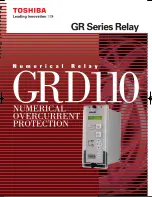
4-30 Protection
and
Control BE1-CDS220
Coordination Settings for Negative-Sequence Overcurrent
The 51Q settings should be checked for coordination with phase-only sensing devices such as
downstream fuses and reclosers and/or ground relays. To plot the negative-sequence time current
characteristics on the same plot for the phase devices, you need to multiply the negative-sequence
element pickup value by the correct multiplier. The multiplier is the ratio of phase current to negative-
sequence current for the fault type for which you are interested. To plot the negative-sequence time
current characteristics on the same plot for the ground devices, you need to multiply the pickup value by
the multiplier for phase-to-ground faults (see Table 4-16).
Table 4-16. Fault Type Multipliers
Fault Type
Multiplier
Ph-Ph m
=
1.732
Ph-Ph-G m
>
1.732
Ph-G m
=
3
3-Phase m
=
Infinity
For example, a down stream phase 51 element has a pickup of 150 amperes. The up-stream 51Q
element has a pickup of 200 amperes. To check the coordination between these two elements for a
phase-to-phase fault, the phase overcurrent element would be plotted normally with pickup at 150
amperes. The 51Q element would be shifted to the right by the appropriate factor m. Thus, the
characteristic would be plotted on the coordination graph with pickup at: (200 amperes)
∗
1.732 = 346
amperes.
Generally, for coordination with down stream phase overcurrent devices, phase-to-phase faults are the
most critical to consider. All other fault types result in an equal or greater shift of the time current
characteristic curve to the right on the plot.
Delta/Wye Transformer Application
Often, the phase relays on the delta side of a delta/wye transformer must provide backup protection for
faults on the wye side. For faults not involving ground, this is not a problem since the phase relays will
see 1.0 per unit fault current for three-phase faults and 2/
√
3 (1.15) per unit fault current for phase-to-
phase faults. However, for faults involving ground, the sensitivity is reduced because the zero-sequence
components are trapped in the delta not seen by the delta-side phase relays. The phase relays will see
only 1/
√
3 (0.577) per unit current for phase-to-ground faults.
Negative-sequence overcurrent protection is immune to the effect caused by the zero-sequence trap and
30 degrees phase shift provided by the delta/wye transformer. For a phase-to-ground fault, the magnitude
of the negative-sequence components is 1/3 the magnitude of the total fault current. On a per unit basis,
this is true for the fault current on the delta side of the transformer as well. (The previous statement
specifies per unit since the actual magnitudes will be adjusted by the inverse of the voltage ratio of the
delta/wye transformer.) Thus, backup protection for phase-to-ground faults on the wye side of the
transformer can be obtained by using negative-sequence overcurrent protection on the delta side with the
pickup sensitivity set at 1/3 per unit of the magnitude of the phase-to-ground fault for which you wish to
have backup protection.
BREAKER FAILURE PROTECTION
BF - Breaker Failure Protection
BE1-CDS220 relays provide one function for breaker failure protection. This function includes a timer and
a current detector. The current detector can be attached to any of the three phase CT input circuits by the
BESTlogic mode setting. Figure 4-27 shows the Breaker Failure logic block. It is recommended that the
CT input circuit used by the breaker failure function be connected to CTs mounted directly on the
protected breaker. The function has two outputs:
BFPU
(breaker failure pickup) and
BFT
(breaker failure
trip).
Summary of Contents for BE1-CDS220
Page 2: ......
Page 10: ...viii Introduction BE1 CDS220 This page intentionally left blank...
Page 36: ...ii Quick Start BE1 CDS220 This page intentionally left blank...
Page 48: ...ii Input And Output Functions BE1 CDS220 This page intentionally left blank...
Page 66: ...iv Protection and Control BE1 CDS220 This page intentionally left blank...
Page 112: ...ii Metering BE1 CDS220 This page intentionally left blank...
Page 116: ...5 4 Metering BE1 CDS220 This page intentionally left blank...
Page 166: ...ii BESTlogic Programmable Logic BE1 CDS220 This page intentionally left blank...
Page 176: ...7 10 BESTlogic Programmable Logic BE1 CDS220 This page intentionally left blank...
Page 234: ...8 56 Application BE1 CDS220 This page intentionally left blank...
Page 236: ...ii Security BE1 CDS220 This page intentionally left blank...
Page 240: ...9 4 Security BE1 CDS220 This page intentionally left blank...
Page 242: ...ii Human Machine Interface BE1 CDS220 This page intentionally left blank...
Page 256: ...10 14 Human Machine Interface BE1 CDS220 This page intentionally left blank...
Page 258: ...ii ASCII Command Interface BE1 CDS220 This page intentionally left blank...
Page 422: ...14 32 BESTCOMS Software BE1 CDS220 This page intentionally left blank...
Page 424: ...ii Time Current Characteristics BE1 CDS220 This page intentionally left blank...
Page 452: ...ii Terminal Communication BE1 CDS220 This page intentionally left blank...
Page 456: ...C 4 Terminal Communication BE1 CDS220 This page intentionally left blank...
Page 458: ...ii Settings Calculations BE1 CDS220 This page intentionally left blank...
Page 475: ......
















































